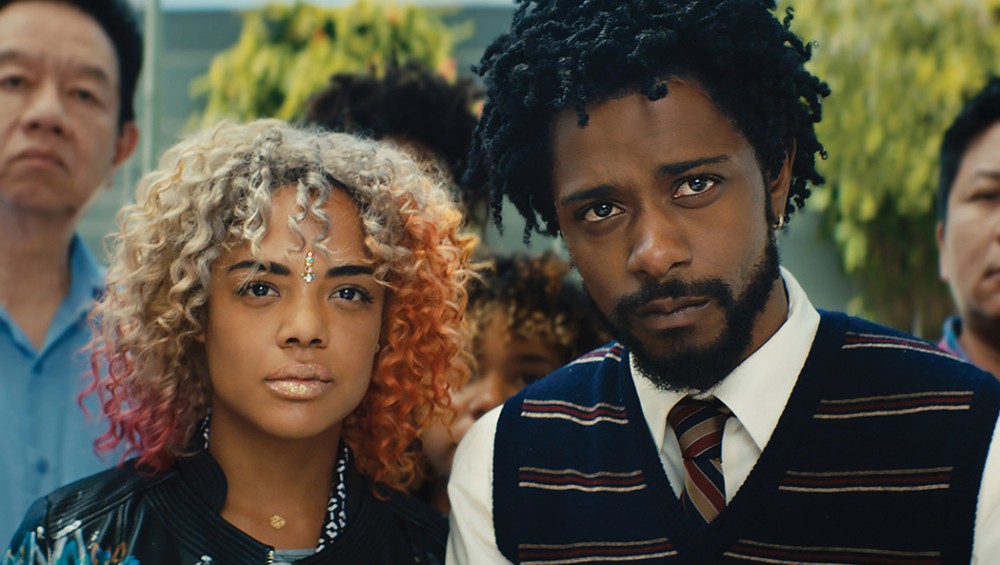BlacKkKlansman, Sorry to Bother You, and the “white voice”
If whiteness is a fiction, it's one that does a lot of damage.

In both Spike Lee’s BlacKkKlansman and Boots Riley’s debut film Sorry to Bother You, a key plot device is a black character using a “white voice” on the phone. This device is played for laughs, but it allows each director to say something serious about race and class.
In BlacKkKlansman (based loosely on real events), Ron Stallworth (John David Washington) is the first black officer on the Colorado Springs police force in 1979. Trying to climb the ranks of his investigating unit, he calls a number advertising the Ku Klux Klan in the local paper, pretending to be an angry white man eager to learn more about the organization. The Klan takes the bait. Obviously Ron can’t show up for a cross burning in person, so he convinces a white partner, Flip Zimmerman (Adam Driver), to act as his body double. “Black Ron” keeps working the Klan on the phone and “white Ron” shows up in person.
Read our latest issue or browse back issues.
A lot is made of whether Ron can “talk white.” His superior officers argue that a white man would immediately hear racial difference in a voice, though Ron insists that he is fluent in both “jive and the King’s English.” After Ron proves them all wrong and gets in so deep with the Klan that he is having regular phone conversations with David Duke himself, he asks the Grand Wizard if he can tell the difference between a black man and a white man on the phone. Duke (Topher Grace) insists that yes, of course he can, and proceeds to give Ron a lesson on how black people talk.
The joke, of course, is on Duke. But it is also on us, because if Stallworth really does think there is a difference between jive and the King’s English, you wouldn’t know it. He sounds the same no matter to whom he’s talking, and if we think we can hear the difference, we are buying into the same racial essentialism the movie wants to critique.
The back and forth between “white Ron” and “black Ron” and “black Ron pretending to be white” gives the movie its tension and most of its humor—and it is a very funny movie about the very unfunny persistence of white supremacy in American culture.
The theme of racial passing is heightened in Flip’s journey as Ron’s body double inside the Klan. Flip is Jewish and quickly learns that white supremacy includes virulent anti-Semitism, which means that he is also passing as white when he shows up in lieu of his black partner. The very fact that race does not line up easily with cultural markers like speech or even skin tone is part of the movie’s point. Racism isn’t just a bad form of whiteness; racism creates whiteness.
Sorry to Bother You takes that premise and pushes it even further. It pushes everything further. It is a mix of allegory, farce, and sci-fi fantasy. But the central conceit also revolves around “white voice.” Cassius Green (the name already hints at the allegory) is having trouble landing sales in his telemarketing job in Oakland until another, older black employee takes him aside and tells him to use his white voice. A white voice is what white people think they should sound like, explains Langston (Danny Glover): like they don’t have a care in the world, like they don’t really need to work and all their bills have always been paid, like they might hang up the phone and go play a squash game. It’s not, it turns out, a voice most white people can pull off.
But Cash (Lakeith Stanfield) is a natural. Once he starts using his white voice (which is David Cross’s voice dubbed over his speech), he quickly climbs the ranks to the Power Callers club—an elite squad of telemarketers tasked with selling things far more lucrative and nefarious than magazine subscriptions. Here the movie takes a swerve into sci-fi territory. In this not-so-alternate reality, unregulated capitalism is the all-encompassing ruling force, represented by the mysterious company WorryFree, which promises a lifetime provision of food and shelter in exchange for a lifetime labor contract. Soon enough the logic of maximal profit infiltrates every crevice of human life, including the human body. To say more is to spoil the surprise—and the last third of the movie is a wild ride.
Race in this world is a tool to manipulate, punish, and motivate workers to give even more of themselves to The Market. Whiteness is an aspiration tied to wealth and freedom that almost no one—white, black, or brown—can achieve. And those who do achieve it do so literally on the backs of everyone else.
This does not mean that race does not matter in the film. Bodies that appear as nonwhite are always the ones that suffer the most. BlacKkKlansman might agree with Sorry that whiteness is a fiction. The message of both films is about the very real violence and damage that fiction has wrought and continues to wreck.
The differences of race and class disturb the notion that Americans have a common story. The white voice is a brilliant device to explore features of American culture that are so foundational they can be hard to name, maybe especially for those who pass as white.
A version of this article appears in the print edition under the title “White voice.”






